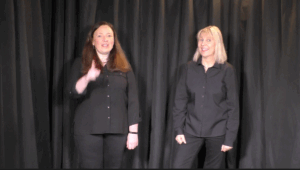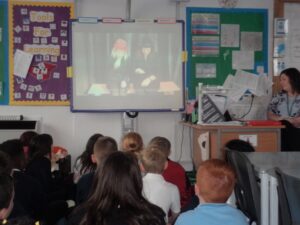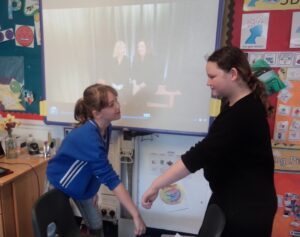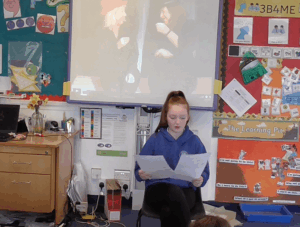After 3.5 years of tapping into childrens’ love of Creative Drama to motivate and inspire them to read and write, Drama Studio Teacher- Owners Julie and Louise have produced a resource for teachers to use directly within their classrooms, any time that suits you.
The Primary School teachers that we worked with referred to it as Drama Literacy and we called our teaching Videos – Over To You
All children were able to access the literacy activities at their own level. Using drama as a stimulus for writing in this way is like sprinkling some pixie dust into your classroom. You can almost sit back and watch the magic happen. The children are more engaged and motivated to complete their writing; and there isn’t that ‘writer’s block’ that many children have because they already came to their jotters full of ideas. The resource is excellent!
Natalie Brodie, West Lothian
Background To The Resource
Our work at Canal View Primary School in Wester Hailes, Edinburgh was followed by a series of Pilot studies during 2021-2022 to enable teachers across Scotland to evaluate the resource.
Highly positive Pilot evaluations have been returned to us and we have been further building it throughout the past year. Schools now implementing the lessons across the Primary stages have consistently returned very positive feedback from both teachers and students. Using key drama techniques to introduce popular topics and creative storylines, we prompt pause points throughout the videos for an OVER TO YOU! This is the time for students to enact the scenes for themselves, incorporating their own ideas and to do the embedded Literacy tasks where appropriate and to write their own stories.
They will then share their work to the class or to a partner re-engaging with the presentation and physical aspects of Drama.
IN SUMMARY THE FORMAT IS DRAMA>LITERACY EMBED >DRAMA (SHARE/PRESENT)
This FULL CIRCLE format is the KEY ELEMENT that propels Literacy motivation and raises Attainment as students see Literacy tasks not simply as an Add-On but an integral part of the lesson .
The Format
Our “key to success”.
Consistently exposing your students to the format, reinforcing their interactive skills and making sure the Literacy elements are always EMBEDS and not simply add-ons is key, even when a writing task is at the end of the Drama Lesson.




What’s Available Now Within This Resource
The resource consists of 3 Modules for use throughout the academic year currently available to use with Primary 1/Reception -Primary 7/Year 6. You can preview what’s available in each module below.
Read here about how teachers are currently accessing and implementing the resource.
Session 2025-2026
Register now for the next session and get started right now – you can take part as a whole school or an individual teacher.
Contact us for price details and include the number of classes in your school.
The Story Behind The Resource Creation
Many children struggle with Literacy, particularly writing and we found in our research that they often describe feeling overwhelmed by the technical aspects of it – the grammar, vocabulary, punctuation, spelling and content for creative work. Edinburgh Headteacher Ann Moore asked us if we could use Drama to help them overcome these barriers and so the project began.
Prior to lockdown DS teachers Julie and Louise had been working for 3.5 years of work at Canal View Primary School in Wester Hailes Edinburgh introducing Drama Literacy. We had been asked to tap into the students’ love of Drama and to use this to help them with writing and reading elements of Literacy.
It was an incredible learning experience for everyone involved but so dynamic that we we felt we had to share it and to trial our findings with other teachers, hence the Pilot.
Teachers taking part in the Pilots have been given access to Video Lessons delivered by us. The students watch the video and receive detailed instructions for their “Over To You” activities throughout. Teachers pause the video when the class has to do the activity and organise their classes to get started.
Students are also given writing tasks about the Drama lesson or to use within it. For younger students this is very often linked to drawing pictures and writing simple captions. They usually enjoy these activities, talking in pairs and to the class about their work, continuing the spoken element, adding value to it and developing a good and positive attitude towards writing.
Upper school lessons also embed writing tasks right within the activities themselves, demonstrating purpose and real reasons to write. From our work at Canal View this interactive type of written work was hugely beneficial in changing attitudes to writing and inspiring children to write.
Below you will find details and examples of the resource, pilot evaluations where you can read how teachers found using it and the reaction of their students!
Ultimately we want to build a responsive resource for students and teachers which uses classroom Drama to impact on student attainment in writing and reading as well as in talking and listening.
If you have any questions about the resource please get in touch – info@thedramastudio.com
Teacher Pilot Evaluations
- Spring 2023 pilot evaluations and examples of work
- Evaluations June 2022
- Upper school evaluations
- Lower school evaluations
You can also view video clips and photos on our Twitter page at https://twitter.com/dramastudioedin
Summary Of Key Points Made From Feedback On The Pilot Lessons So Far
- 1. It is user friendly for both teachers and students. Students have been very enthusiastic about the lessons and teachers have found the format easy to use.
- 2. Teachers have found that the engagement with the Drama activities has carried over into writing activities which is exactly what has been intended.
- 3. Outgoing and shy students alike have responded well to the format and settled into it. It has also been reported that students with behavioural issues have coped fairly well as have mixed age groups in composite classes. It has been mentioned that after the Covid months the activity has linked well to Health and Wellbeing. Children have liked the routine and format of the presentation.
- 4. Teachers have enjoyed the opportunity of being able to observe individual students during the sessions.
- 5. Time -wise, some teachers have completed both Drama and written Literacy tasks at one sitting while others have split the lessons or re-capped on another day to do the written aspects.
- 6. Some teachers have reported internet connection issues on occasion but most people have been able to continue to complete the lessons.
- 7. Many teachers have remarked that they have felt more confident to approach teaching Drama in the classroom for themselves and have tried out their own ideas as a result. In this way they have mentioned that format naturally embeds a teacher training element to it.
- 8. Teachers have asked for more classroom games which we can provide with future lessons.
- 9. Teachers have asked if we can produce more Drama Literacy lessons like these.
While we are delighted to have received such positive and insightful responses to these Pilot lessons, the background work that preceded these is worth considering so that teachers can see how their students are likely to progress.
The Work At Canal View Primary School
We worked will all the classes at some point over this period and took extensive film footage. We also had a “study group class” that we worked with throughout so that we could measure progress closely with one group to chart more specifically the impact of Drama intervention and writing attainment.
Below is sample footage of how this went from when we started with this particular class in Primary 3 (March 2017) until Primary 6 before lockdown set in.
Testing Our Video Lessons With P5 and P7 Study Group
In addition to the weekly sessions Louise and I provided at Canal View we also sent class teachers Video Lessons similar to those used in the Drama Literacy Pilot so that we could test this kind of resource and see how teachers would find it (without us actually being in the room – apart from on screen) and how it would impact on writing. Below is the writing from these video lessons from our Study group in Primary 5 and also from another P7 class.
Primary 6 Drama Literacy Study Group March 2020
In March 2020 just before lockdown we did a Cold Write with the P6 Class that we have been working with as a Control Study since they were in P3 as part of assessing our Drama Literacy and Attainment implications.
We briefed the children in advance that they would be writing their own piece the following week so that they had time to think about their content.
We asked them to think about what makes a good story/account from the reader’s point of view and to recall all the exercises we had been doing over the years in Drama to help with this.
We discussed good ways of using words and description, drawing the reader in, surprising them, using humour etc.
The content would be completely theirs but they could use ideas from Drama stories and from their own real life events.
The story could a personal account like a Diary or as a narrative, a letter or whatever form they choose.
We explained that the teachers would not be able to help them with ideas and could only encourage them and take a look at how they were doing.
The students were very motivated by the idea and on the day of the writing they were all excited and focused in a way that neither we nor the class teacher had expected.
We only managed to complete with some of the children as many were absent at the time due to Covid issues but here is what we got. Some of the pieces are quite dark and tell what is almost certainly a personal story.
The engagement in this task was like nothing we had seen before. They were all very committed to it, so much so that one days when Louise and I weren’t there they opted to carry on with the stories rather that do other activities that would normally have seemed more appealing to them.
In 2018 the Canal View teachers identified the Drama Literacy work we had been doing there over only one year was a key player in the School Improvement Plan.
